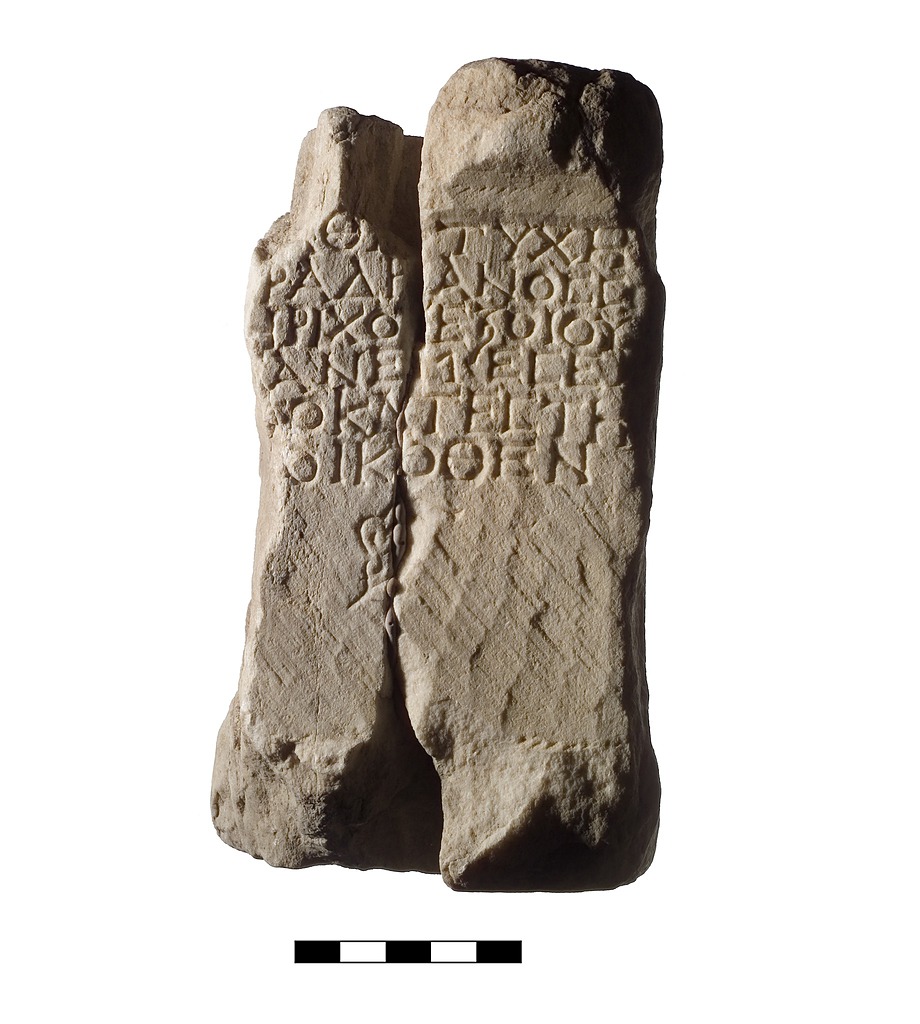40

Vocative Case
You have already learned the four most commonly used cases for Greek nouns and adjectives: nominative, genitive, dative, and accusative. This lesson presents the final case: the VOCATIVE.
The vocative case is used for the person or persons directly addressed. For example:
- Jurymen, I submit the following evidence.
- Where are you going, Odysseus?
Most often, the NOMINATIVE forms of nouns and adjectives double as VOCATIVE forms. When Greek speakers were being formal or polite, they would use the marker ὦ (like the English “O Brother…”) to signal the vocative case, but it is not necessary, and ὦ is often best left untranslated in English.
IDENTICAL NOMINATIVES/VOCATIVES
1. Plural
In the plural, ALL NOUNS/ADJECTIVES simply use their NOMINATIVE PLURAL forms for the VOCATIVE:
- παραδίδοτε, ἄνδρες Ἀθηναῖοι, τὴν πατρίδα.
- You, Athenian men, are betraying your fatherland.
- παραδίδοτε, ὦ ἄνδρες Ἀθηναῖοι, τὴν πατρίδα.
- Athenian men, you are betraying your fatherland.
2. Neuter
ALL NEUTER nouns/adjectives simply use their NOMINATIVE SINGULAR and PLURAL forms for the VOCATIVE:
- παραδίδως, ὦ τέκνον, τὴν πατρίδα.
- Child, you are betraying your country.
- παραδίδοτε, ὦ τέκνα, τὴν πατρίδα.
- Children, you are betraying your country.
3. 1st Declension Feminine
ALL 1st DECLENSION FEMININE NOUNS/ADJECTIVES use their NOMINATIVE SINGULAR forms for the VOCATIVE:
- nominative sing.: ἡ ἡμέρα, ἡ τέχνη
- vocative sing.: ὦ ἡμέρα, ὦ τέχνη
DIFFERENT NOMINATIVES/VOCATIVES
For some declensions, the ending for the MASCULINE or FEMININE SINGULAR VOCATIVE may differ from the NOMINATIVE. In such cases, the vocative is most often formed in one of three ways, none of which offer significant problems of identification:
- 2nd declension: –ος is replaced with –ε
- 3rd declension: the stem is used on its own
- 3rd declension: the stem is shortened to end in an allowable Greek sound
1. Replacing –ος with –ε for 2nd declension
All masculine (and feminine) nouns/adjectives of the 2nd declension form their vocative with –ε.
- παραδίδως, ὦ ἀδελφέ, τὴν πατρίδα.
- Brother, you are betraying your country.
- ἀδελφός → ἀδελφέ (voc.)
2. Using the stem of 3rd declension
Some masculine and feminine nouns/adjectives – e.g., those whose stems end in –ερ, –εσ, –ι, and –υ – use just their STEM for the vocative singular.
- παραδίδως, ὦ πάτερ, τὴν πατρίδα.
- Father, you are betraying your country.
- πατήρ (stem = πατερ) → πάτερ (voc.)
- παραδίδως, ὦ μῆτερ, τὴν πατρίδα.
- Mother, you are betraying your country.
- μήτηρ (stem = μητερ) → μῆτερ (voc.)
- παραδίδως, ὦ θύγατερ, τὴν πατρίδα.
- Daughter, you are betraying your country.
- θυγάτηρ (stem = θυγατερ) → θύγατερ (voc.)
- παραδίδως, ὦ ἄνερ, τὴν πατρίδα.
- Man, you are betraying your country.
- ἀνήρ (stem = ἀνερ) → ἄνερ (voc.)
- παραδίδως, ὦ Σώκρατες, τὴν πατρίδα.
- Socrates, you are betraying your country.
- Σωκράτης (stem = Σωκρατες) → Σώκρατες (voc.)
- παραδίδως, ὦ βασιλεῦ, τὴν πατρίδα.
- King, you are betraying your country.
- βασιλεύς (stem = βασιλευ) → βασιλεῦ (voc.)
1st DECLENSION MASCULINE nouns also usually use just their stem.
- παραδίδως, ὦ Ἑρμῆ, τὴν πατρίδα μου.
- Hermes, you are betraying my country.
- Ἑρμῆς (nom.) → Ἑρμῆ (voc.)
1st DECLENSION MASCULINE nouns that end in –της are an important exception, forming their vocative singular in –τᾰ (S 226).
- παραδίδως, ὦ στρατιῶτα, τὴν πατρίδα.
- Soldier, you are betraying your country.
- στρατιώτης (nom.) → στρατιῶτα (voc.)
- παραδίδως, ὦ ποιητά, τὴν πατρίδα.
- Poet, you are betraying your country.
- ποιητής (nom.) → ποιητά (voc.)
3. Shortening the stem of 3rd declension
If a masculine and feminine stem ends in a CONSONANT other than –ν, –ρ or –ς, the STEM DROPS its final consonants until the word reaches an allowable final sound. For example: ἄρχοντ → ἄρχον.
- παραδίδως, ὦ γύναι, τὴν πατρίδα.
- Woman, you are betraying your country.
- γυνή, γυναικός (stem = γυναικ-) → γύναι (voc.)
- παραδίδως, ὦ παῖ, τὴν πατρίδα.
- Child, you are betraying your country.
- παῖς, παιδός (stem = παιδ-) → παῖ (voc.)
- παραδίδοσαι, ὦ πατρί, ὑπὸ τῶν παίδων.
- Fatherland, you are being betrayed by the children.
- πατρίς, πατρίδος (stem = πατριδ-) → πατρί (voc.)
ADJECTIVES
Adjectives form the vocative just as nouns do. Note the following examples:
- παραδίδως, ὦ κακὲ βασιλεῦ, τὴν πατρίδα.
- Evil king, you are betraying your country.
- κακός (nom.) → κακέ (voc.)
- βασιλεύς (nom.) → βασιλεῦ (voc.)
- παραδίδως, ὦ κακὴ βασίλεια, τὴν πατρίδα.
- Evil queen, you are betraying your country.
- κακή (nom.) → κακή (voc.)
- βασίλεια (nom.) → βασίλεια (voc.)
- παραδίδως, ὦ ἀληθὲς βασιλεῦ, τὴν πατρίδα.
- True king, you are betraying your country.
- ἀληθής (nom.) → ἀληθές (voc.)
- βασιλεύς (nom.) → βασιλεῦ (voc.)
– τὸ τέλος –
Key Terms and Concepts
- VOCATIVE
Exercises
1. The vocative and nominative endings are always identical in which of the following forms:
- singular
- plural
- masculine
- feminine
- neuter
2. When Greek speakers are being polite or formal, they use the following marker before the vocative:
- ὤ
- ὦ
- ὧ
- ὥ
3. Masculine and Feminine nouns/adjectives do not always have matching nominative and vocative singular endings. In these cases, what are the three possible ways that these nouns form their singular vocative? Give an example of each type.
4. Provide the vocative singular and plural for each of the following nouns.
- τέκνον -ου τό child
- ἀδελφή -ῆς ἡ sister
- πατρίς, πατρίδος ἡ fatherland
- ἀδελφός -οῦ ὁ brother
- παῖς, παιδός ὁ child
- δαιμόνιον -ου τό demon
- βασιλεύς -έως ὁ king
- υἱός -οῦ ὁ son
- ἀλήθεια -ας ἡ truth
- πατήρ, πατρός ὁ father
- θυγάτηρ -τρός ἡ daughter
- ἀνήρ, ἀνδρός ὁ man
